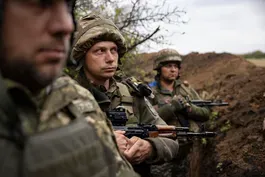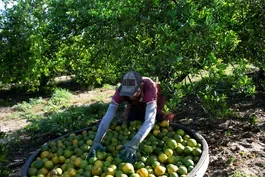
States grapple with minimum age restrictions for buying guns
Clip: 5/13/2023 | 6m 17sVideo has Closed Captions
As states grapple with age limits for buying guns, what’s the potential effect?
It’s been a week of ups and downs for both advocates and opponents of laws that raise the minimum age for purchasing firearms. Lisa Geller, director of state affairs at the Johns Hopkins Center for Gun Violence Solutions, joins John Yang to discuss the impact this type of legislation is having in states that already have age restrictions in place.
Problems with Closed Captions? Closed Captioning Feedback
Problems with Closed Captions? Closed Captioning Feedback
Major corporate funding for the PBS News Hour is provided by BDO, BNSF, Consumer Cellular, American Cruise Lines, and Raymond James. Funding for the PBS NewsHour Weekend is provided by...

States grapple with minimum age restrictions for buying guns
Clip: 5/13/2023 | 6m 17sVideo has Closed Captions
It’s been a week of ups and downs for both advocates and opponents of laws that raise the minimum age for purchasing firearms. Lisa Geller, director of state affairs at the Johns Hopkins Center for Gun Violence Solutions, joins John Yang to discuss the impact this type of legislation is having in states that already have age restrictions in place.
Problems with Closed Captions? Closed Captioning Feedback
How to Watch PBS News Hour
PBS News Hour is available to stream on pbs.org and the free PBS App, available on iPhone, Apple TV, Android TV, Android smartphones, Amazon Fire TV, Amazon Fire Tablet, Roku, Samsung Smart TV, and Vizio.
Providing Support for PBS.org
Learn Moreabout PBS online sponsorshipJOHN YANG: It's been an up and down week for both advocates and opponents of laws restricting gun buyers by age.
On Monday in Texas, where there were two mass murders this month, in the space of a week, a House committee unexpectedly passed a bill to raise the age for buying a semiautomatic rifle from 18 to 21.
The legislation has stalled and is now unlikely to get a vote in the full House.
And on Wednesday, a judge in Virginia struck down federal laws barring gun dealers from selling handguns to anyone younger than 21.
The Justice Department is likely to appeal that ruling, which does not affect either state laws or private gun sales.
Lisa Geller is the Director, State Affairs, The Johns Hopkins Center for Gun Violence Solutions.
Lisa, there are eight states that have age restrictions, fairly tight age restrictions for buying any kind of firearm, any firearm at all.
Do we have an expense sense of what it tells us about whether it helps or not?
LISA GELLER, Johns Hopkins Center For Guns Violence Solutions: We do.
So, as you mentioned, there are several states that have raised the age to 21 to buy certain firearms, some cases all firearms.
And what we know, stepping back, is that the 18 to 20-year-old period is an extremely high risk time for teenagers.
We know that arrests for murders are highest among this age group.
We also know that policies in states to restrict gun purchases to those 18 to 20 have lower rates of gun suicide.
So we do know that protecting those under 21 from buying guns is backed by evidence and keeps youth safe.
JOHN YANG: The two recent shootings are last year rather, the Uvalde shooting and the shooting at the Buffalo supermarket.
Both cases, the shooters were teenagers who bought their weapons legally.
Do you believe that an age limit would have helped in those cases?
LISA GELLER: I do believe that.
I think there are a number of other situations we can point to, notably the Sandy Hook shooter and the Parkland shooter, who also bought their guns legally shortly after turning 18.
And we know that if there were a law in place to restrict that purchase until they were 21, they wouldn't have been able to buy guns just at the time period that they did and carry out the mass harm that they did.
JOHN YANG: What's the significance, do you think, of the ruling in Virginia striking down the federal law that restricted handgun sales to people 21 and over?
LISA GELLER: Well, as you noted, this is federal law.
Federal law states that you have to be 21 years old to buy a handgun from a licensed dealer.
So the Department of justice has already indicated that they're going to appeal this.
I don't want to be an alarmist here, because this is just one district court judge, one federal judge ruling that this law is unconstitutional.
It does not apply yet to residents of Virginia.
I don't want to state that this is going to go into effect immediately, even if the higher court does agree with the lower court.
But we know that this is dangerous.
This goes against the will of the people.
In fact, even a Fox News poll from just a couple of weeks ago found that 81 percent of people are in favor of raising the age to 21 to buy all guns.
We also know that guns are the leading cause of death for teenagers.
So doing this and issuing this kind of dangerous decision at a time when guns are killing teens more than any other means is extremely dangerous and not consistent with what we see in the data.
JOHN YANG: But this ruling also doesn't apply to private gun sales.
Someone 18 to 20 could buy a gun from a private dealer in the parking lot of a licensed dealer, but he couldn't go inside?
I mean, is that a problem that you'd like to see closed in the law?
LISA GELLER: There are too many loopholes in our gun laws.
Just as you indicated, this does not apply to private sales.
At Johns Hopkins, at the Center for Gun Violence Solutions, we believe that there should be universal background checks on all gun sales.
We believe that the age to buy guns should be raised for all gun sales because it really doesn't make sense that someone can't go into a federally licensed firearm dealer at 18 and buy a gun.
But as you indicated, they can have a gun given to them as a gift in some states, or they can buy it through a private transaction.
Absolutely, this law should be amended and loopholes should be closed to keep people safe.
JOHN YANG: You mentioned earlier the link with suicide and obviously gunshot death is, I think, the leading cause of death among children now.
Is there any evidence of a link between states where it's easier to get a gun and higher rates of suicide?
LISA GELLER: The biggest predictor of a suicide is access to a firearm.
We know that 90 percent of suicide attempts with a firearm are fatal, whereas only two to 3 percent of suicide attempts with non-firearm means are lethal.
So, if there's anything you take away from this conversation, it's that guns are the reason why suicides are so high in this country.
We know that putting time and space between someone and a firearm purchase is the best way to save their life, and that goes for children, but also adults.
And we also know that many mass shooters, particularly these young mass shooters, may be suicidal.
When they are carrying out this mass shooting, they are also, at the end, taking their own life.
So I do believe that mass shooting prevention also have to include suicide prevention.
JOHN YANG: You know, after the mass shooting in Texas last week, we heard the governor of Texas come out and when asked about tougher gun laws, talked more mental health services.
They make it sound like it's one or the other.
Is that a false dichotomy?
LISA GELLER: We absolutely need more mental health care in this country, but there's no way to address gun violence in this country without addressing the gun.
Data shows that only about 4 percent of violence in this country can be directly linked to mental illness.
So even if were able to prevent every single individual living with mental illness from buying a gun, we would not see meaningful reductions in violence and even more specifically, in gun violence.
So I would never say that a shooter is mentally well, but that does not mean that they are mentally ill. JOHN YANG: Lisa Geller, the Johns Hopkins Center for Gun Violence Solutions thank you very much.
LISA GELLER: Thank you for having me.
New documentary shows Ukrainians’ fight for survival
Video has Closed Captions
New documentary shows Ukrainians’ fight for survival, devastation of war (7m 23s)
What’s behind a severe decline in Florida’s citrus harvest
Video has Closed Captions
What’s behind a severe decline in Florida’s citrus harvest (6m 43s)
Providing Support for PBS.org
Learn Moreabout PBS online sponsorshipSupport for PBS provided by:
Major corporate funding for the PBS News Hour is provided by BDO, BNSF, Consumer Cellular, American Cruise Lines, and Raymond James. Funding for the PBS NewsHour Weekend is provided by...













